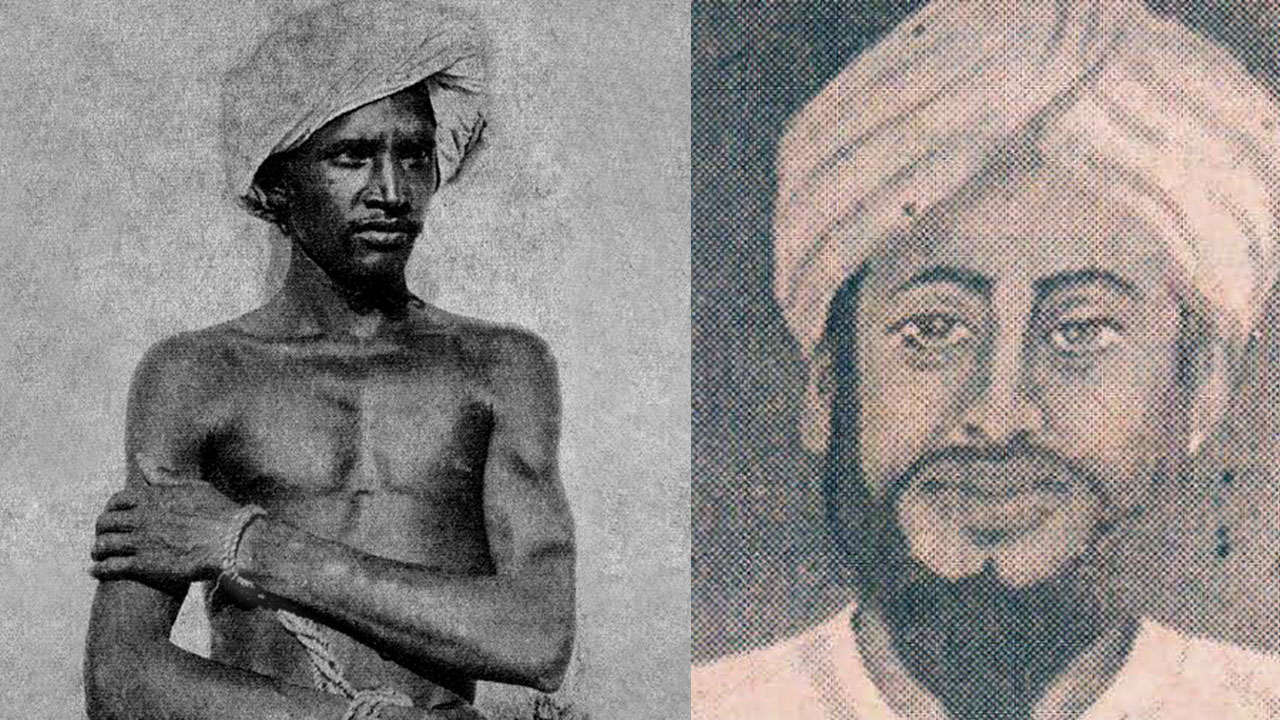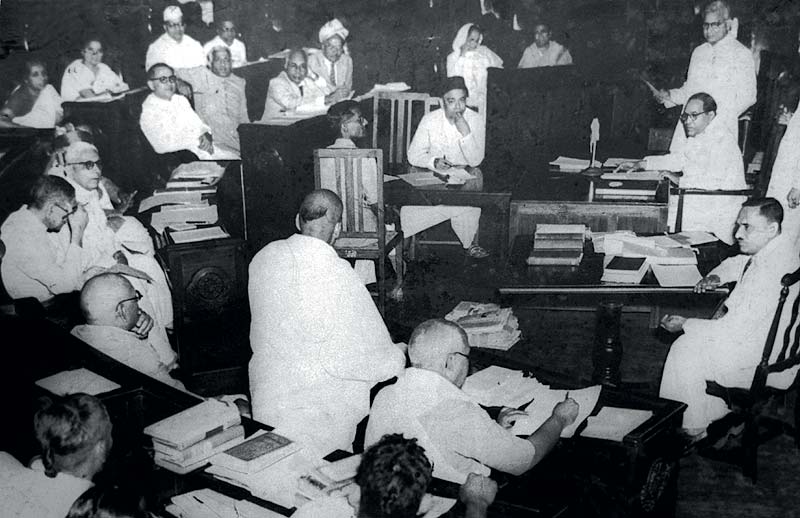Dr Bhimrao Ramji Ambedkar and Mohammad Ali Jinnah were among the prominent personalities of modern India. However, what Ambedkar accomplished for Dalits, Jinnah never could for the Muslims, despite making strenuous efforts.
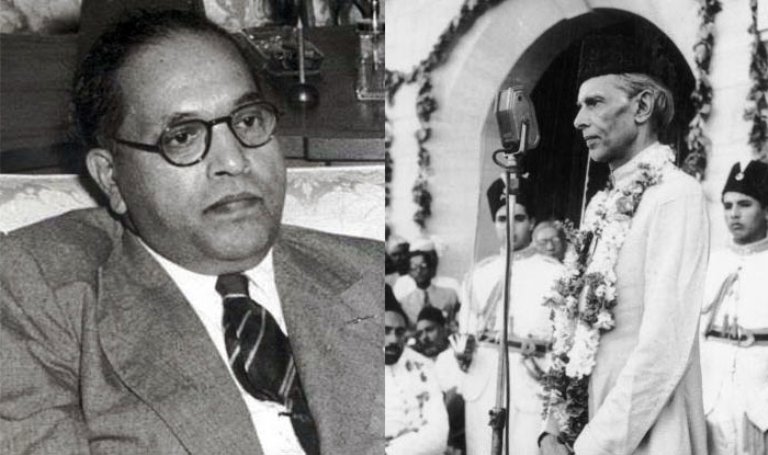
There are many reasons why we should do a comparative study of Jinnah and Ambedkar. Both were contemporaries and both fought for their respective communities. Though discussing Jinnah, especially in a favourable light, is a taboo in independent India, that should not stop us from comparing him with his contemporaries.
Ambedkar was born in Mhow, a small town in today’s Indore district, Madhya Pradesh, on 14 April 1891. He was the 14th and the youngest child of Ramji Maloji Sakpal and Bhimabai. His childhood was spent amid great adversities. When he went to school, he carried on his shoulders the cross of both poverty and a Mahar’s untouchability. Among his siblings, Ambedkar was the only one who could clear his school examinations. When he got admission in the Government High School, Elphinstone, Mumbai, he became the first Dalit student of the institution.
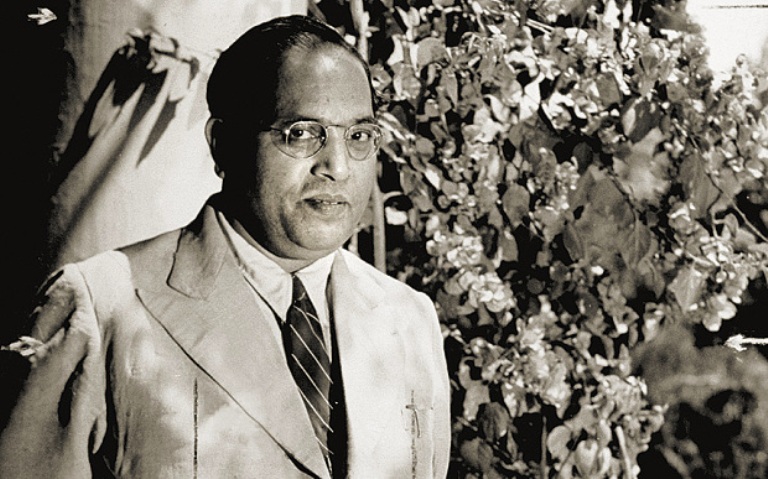
In 1907, he passed his matriculation examination. Then he joined Mumbai University and became the first Dalit to have been admitted to a college. During his college life, he had to consistently face caste-based humiliation and disdain. Life itself was a struggle. Though he was good at academics, he was never considered equal to the other students. In his school, he had to sit at a distance from others. He was not allowed to even touch the vessels in which drinking water was kept. Only if someone from an upper caste poured the water from a height into his cupped palms, he could quench his thirst. No teacher paid attention to him, none tried to help him. But this reproach, this contempt only made his resolve of leading a good life stronger. That made him empathize with the others whose lot was no different.
Jinnah also didn’t have a happy childhood but it wasn’t as much of a struggle as Ambedkar’s. He was not cursed to face humiliation and social ostracization.
There is no consensus on the date of birth of Jinnah. Some say he was born on 20 October 1875 while others believe he was born on 25 December 1876. Jinnah was the eldest child of Mithibai and Jinnabhai Punja. His father was a prosperous Gujarati businessman. However, he fell on hard times after suffering a huge loss in his business. But Jinnabhai did not allow his financial problems to come in the way of his son’s upbringing. Jinnah was born at Kathiawad in Gujarat and his childhood was spent in Sindh. His father made all possible arrangements for his proper education and tried to give him a congenial atmosphere for growth. He began his education from Sindh-Madrasa-tul-Islam. Later he moved to Gokuldas Tej Primary School and then to Christian Missionary Society High School, Karachi. After matriculation, he did apprenticeship in Graham’s Shipping and Trading Company. He soon left the British company to study and at the age of 19, was admitted to the bar.
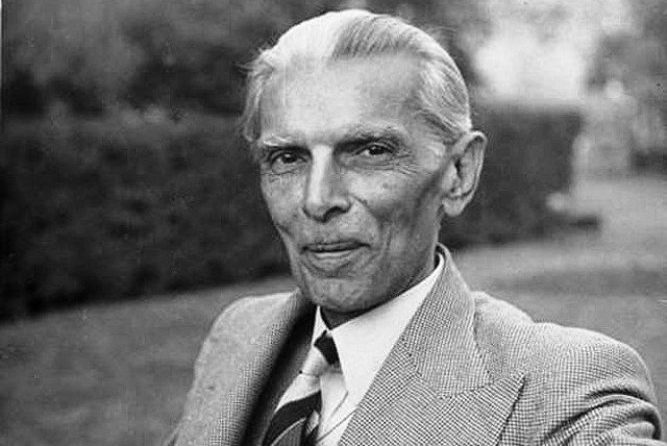
Jinnah’s father ensured that he was cocooned from the problems his family was facing. Till his father’s business ran aground, Jinnah did not have to take up any familial responsibilities. Protective parents and a life of relative comfort made Jinnah a sophisticated person given to fine tastes. It is said that once, while he was still a little boy, other children invited him to join them for a game of marbles in the lane where his house was located. Jinnah tried to play for a while but soon got up and after dusting his hands, walked away saying that he was not meant for dust. And he was not.
As children, Ambedkar and Jinnah led vastly different lives, but as destiny would have it, both ended up leading big communities. Muslims and Dalits together formed a large social group in undivided India, though their problems were different. But both the communities felt that they were missing something and both had to face social problems. Both Jinnah and Ambedkar had almost the same views about the Congress. Both believed that given the domination of brahmanical elements in the party, it could not be relied upon for protecting the rights of their communities. Initially, they adopted similar policies and for a short period, they worked in tandem too. But soon they parted ways.
By the time he became a Doctor of Science, Ambedkar had become quite well known in the country. In 1926, he was nominated to the Bombay Legislative Council and joined the struggle for equality. In 1927, he decided to launch a mega-movement against untouchability. He led movements to secure the rights of all peoples to public sources of water and for opening the doors of Hindu temples to Untouchables. He was highly critical of the apathy of the mainstream political parties towards elimination of the caste system.
In 1896, Jinnah joined the Indian National Congress. At the time, he was a proponent of educational and legal reforms and of equal opportunities for everyone. He became a member of the Imperial Legislative Council. He lobbied for the enactment of a law to ban child marriages and to improve the laws relating to Muslim Waqf properties. He was also associated with the Sandhurst Committee, which led to the establishment of the Indian Military Academy at Dehradun.
The Muslim League came into existence in 1906. Jinnah maintained a distance from the League – but not for long. Sick and tired of the brahmanical domination in the Congress, he joined the Muslim League in 1913. He chaired the Muslim League’s annual session in Lucknow in 1916. The same year, the Muslim League and the Congress signed the Lucknow Pact, under which they agreed to share a common platform to fight for self-rule. After the emergence of Mahatma Gandhi in Indian politics in 1918, Jinnah and the Congress began drifting apart and, in 1920, he resigned from the Congress. In 1923, he was elected to the Central Legislative Assembly from Bombay. As early as 1927, he had begun talking about the future Constitution of independent India and the status of Muslims in it.

Jinnah’s concerns were not different from Ambedkar’s. The latter was concerned about the security of the Dalits and their share in the governance and resources once the English departed from the Indian shores. On 8 August 1930, addressing a conference of the exploited classes, he said that the exploited classes would have to seek freedom not only from the British but also from the Congress. “We will have to build our path ourselves. Only political power will not end the problems of the exploited. Their emancipation lies in them securing their due place in society.” Unlike Jinnah, Ambedkar avoided direct confrontation and use of violent means. Ambedkar was much more mature than Jinnah and it was this maturity that led him to signing the Poona Pact with Gandhi on 24 December 1932. The Poona Pact secured reservation for the Dalits in legislative bodies. On the other hand, due to his impatience and insolence, Jinnah could never compromise with anyone.
Ambedkar made Dalits realize that they had a share in the land on which they lived and in the sky under which they slept. This was the biggest achievement of Ambedkar. He called upon Dalits to acquire education, organize themselves and agitate.
Although both Jinnah and Ambedkar were protagonists of the Western model of democracy, they had reservations about the “one person, one vote” system. That kept both of them away from the so-called mainstream. While Ambedkar reconciled himself to the idea of a nation within a nation, Jinnah could never do so.
Ambedkar stood for equality and diversity. He never demanded a separate nation for Dalits. He only wanted to secure their rights. Jinnah had already revolted against his religion and so revolt was no big deal for him. Ambedkar was patient. He was ready to wait; he was ready to secure rights of his community little by little. But Jinnah was impatient; he wanted to get everything in one go.
Ambedkar strongly believed that elimination of capitalism and caste was indispensable for building a strong democracy. Jinnah was also a votary for socialism but he was not against capitalism. Ambedkar advocated social unity, harmony and secularism. Jinnah also talked of social unity and harmony but despite not being religious, he could not give up his advocacy for his religion.
Ambedkar was opposed to the Brahmanism in Hindu religion and believed that religious fanaticism was a danger to the country. Ambedkar saw commonalities between the problems of Dalits and religious minorities and often talked of waging a common struggle. After he failed to change the Hindu religion, he embraced Buddhism. But Jinnah took his opposition to Hinduism to the extreme – to the extent of dividing the nation.
What did Ambedkar and Jinnah achieve? Seventy years after Independence, what is the condition of their followers? The social classes that Ambedkar led still have faith in him and he is their undisputed leader. Ambedkar did not create an independent Dalit nation but he infused enough consciousness into the Dalits to enable them see themselves as a distinct and strong nation within India. No matter how imperfect the system of reservations may be, there is little doubt that it has helped Dalits find their feet. Ambedkar continues to inspire Dalits to fight for their rights. Dalits take pride from the fact that both the reservation system and the Constitution, which has created the system, are the gifts of their leader to them.
On the other hand, the Muslims are divided as far their views on Jinnah are concerned. The country was split into two, and with it the Muslims too. The Muslims in India are also divided into many classes. The exploitation of the Dalits has not ended and their battle for equality continues, but their Constitutional rights and their bargaining power are much more than of the Muslims or other religious minorities. The Muslims, who banked on Jinnah, are nowhere. Jinnah could not make equality even the cornerstone of Pakistan’s Constitution, nor could he ensure equal political space for all in that country. The issues which led him to demand – and secure – a separate country are today the foundation of Pakistan. Like Jinnah, Pakistan too is a victim of inner conflicts.
Jinnah left them to their fate those Muslims who did not pay heed to him. Muslims in India are still battling for their identity. They are today subject to the same disabilities that Ambedkar’s community was subject to in the pre-Independence era. While Ambedkar’s community is throwing off the yoke of social ostracization, lack of education, humiliation and inequality, the community that Jinnah claimed to represent and fight for is increasingly getting sucked into the morass of ostracization, lack of education and unemployment.
Today, we can see that many of Jinnah’s apprehensions were not misplaced. Jinnah saw in the principle of “one person, one vote” the makings of majoritarianism. Gandhi’s belief that with time, the majority community would become more mature and bring all sections of society on a par with itself seems to be proving wrong. The apprehensions of Ambedkar regarding caste conflicts have come true. Destiny had given both Ambedkar and Jinnah the responsibility of securing the rights of their respective communities. However, today, Muslims are going downhill while Ambedkar’s community is trying to touch the sky, even if it is standing on shaky ground.
Forward Press also publishes books on Bahujan issues. Forward Press Books sheds light on the widespread problems as well as the finer aspects of Bahujan (Dalit, OBC, Adivasi, Nomadic, Pasmanda) society, literature, culture and politics. Next on the publication schedule is a book on Dr Ambedkar’s multifaceted personality. To book a copy in advance, contact The Marginalised Prakashan, IGNOU Road, Delhi. Mobile: +919968527911.
For more information on Forward Press Books, write to us: info@forwardmagazine.in

